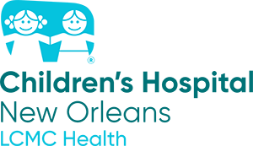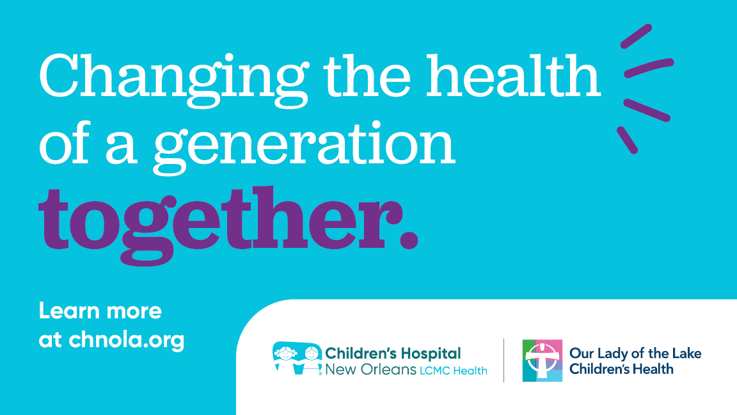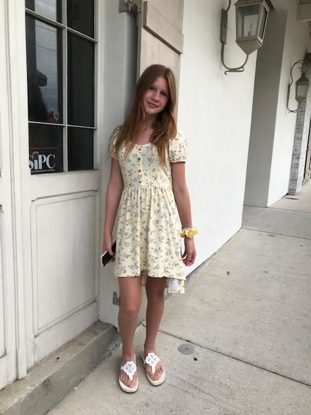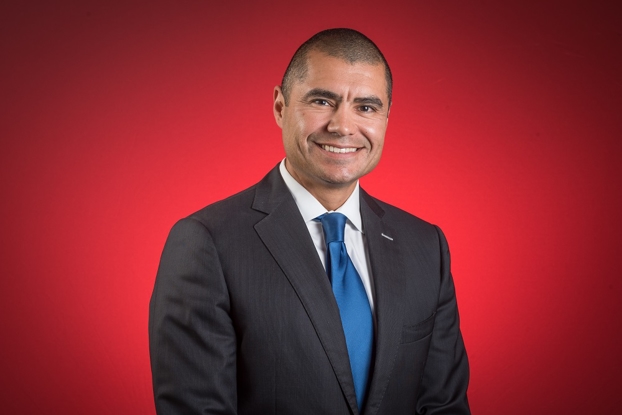Seeking help for suicide prevention? Inpatient programs offer hope for many children and teens
- Category: General Health, Living Well, Mental Health
- Posted on:
- Written By: Allegra F. Hartman, Licensed Clinical Social Worker

September is National Suicide Prevention Awareness Month, an opportunity for behavioral health experts to share information and resources about signs of suicidal ideation and ways to access help. The 51-bed Behavioral Health Center at Children’s Hospital New Orleans is at the forefront of proactively addressing mental and behavioral health needs for children and adolescents. It is the only psychiatric program in the Gulf Coast region exclusively dedicated to crisis-intervention and support for this age group. For some kids and teens at risk of suicide, an inpatient program is the best choice for gaining access to the appropriate level of expert help and support. Below, Allegra F. Hartman, Licensed Clinical Social Worker, Inpatient Behavioral Health Program Coordinator at Children’s Hospital, answers the top questions teens and parents ask about the inpatient program.
When should a teen seek inpatient help for suicide prevention?
Anyone who is experiencing active thoughts of wanting to hurt themselves or someone else, or if they are expressing feelings of hopelessness and not wanting to be alive anymore, should be evaluated by a mental health professional immediately. Evaluations can be completed by psychiatrists in our emergency department, and those psychiatrists will ultimately determine if an individual meets the criteria for inpatient admission.
Our inpatient behavioral health services are focused on acute crisis management, and we offer a comprehensive program, including a full psychiatric assessment by a board-certified Child and Adolescent Psychiatrist. For individuals who qualify for admission, we provide daily therapeutic programming which includes art, music, and movement groups. In an effort to support families through the acute crisis period, our medical staff will also participate in family meetings and will coordinate care and follow-up appointments prior to discharge.
Are there signs parents should look for that their child or teen may be struggling?
Many children and adolescents may display signs of depression or anxiety, which suggests that they are struggling. Signs to look for:
- Increased isolation: Staying locked up in their room with little to no desire for social interaction
- Irritability: Parents may sometimes feel as though they are having to walk on eggshells around their child to not cause a fight
- Loss of interest: No longer having a desire to participate in activities they once enjoyed
- Self-harm: Parents may notice unexplainable scratches or cuts on their child, indicating that he or she is purposely harming themselves
- Heightened emotions: Your child or teen may have an unreasonable or uncontrollable reaction to things
Upon admission, each patient receives a program packet. What is its importance and purpose?
The program packet is designed to emphasize and identify treatment goals, coping skills, psychoeducation, and communication styles to aid patients in their continued recovery. Patients are encouraged to work on their packet daily while they are a patient in the unit, and prior to discharge, all patients will have completed their packet. We encourage patients to keep this as a valuable resource for the future.
What is the focus of your daily process groups in the unit?
Patients attend multiple process groups throughout the day. Some of these are educational and focus on topics such as peer pressure, bullying, depression, anxiety, medications, and safe sex. Other groups, led by the therapy team, seek to engage patients in open dialogue with one another about the various issues that they have encountered. The therapy team aims to introduce psychoeducational topics via a strength-based approach. Interventions such as dialectical behavioral therapy (DBT), cognitive behavioral therapy (CBT), positive psychology, mentalization, and psychodynamic therapy are all utilized in a supportive group environment.
What is the process for safety planning for each patient who is admitted to the inpatient unit?
We have an entire section on safety planning in the program packet, which helps our patients clearly lay out a plan for how they will remain safe when they leave the unit and return home. Working with our medical team, patients are asked to write their plan in detail, including a list of the things they have learned about themselves during their hospitalization, their plan for adhering to their medications if applicable, and specific ways they plan to cope with issues related to their school, home life, and any other potential stressors. They are also asked to explain in detail how they will plan to deal with future sadness, disappointment, anger, fear, and worry and how they will keep themselves and others safe. We work closely with them to incorporate the tools they have learned on the unit, including using resources like relaxation and breathing, engaging in activities that help them cope such as journaling or sports, as well as accessing social, professional, and emergency resources.
What is the focus of the family meeting? Are families made aware of the safety planning process at this time?
During the family meeting, the goal is for everyone—including the patient as well as the parents and/or caregivers—to talk about the events leading up to inpatient admission, what they have learned during their time here, and treatment goals. Patients are asked to discuss the various coping skills they have learned while on the unit and how they plan to implement them when in a time of crisis at home. Safety planning is also discussed with therapists encouraging parents to make the home environment safe (i.e., locking up any weapons and medications). If a patient is not currently receiving any outpatient services, the patient will also be set up with an appointment prior to their discharge from the unit.
The Children’s Hospital New Orleans Behavioral Health Center is a 51-bed inpatient unit caring for children ages 7 to 17. We offer acute crisis management, a comprehensive psychiatric assessment, medication management, and support families in accessing appropriate outpatient services. Hospitalization may be needed if a child exhibits behaviors that cannot safely be managed or are potentially dangerous to themselves or others. The primary goal of our inpatient services is to stabilize the crisis and teach each child and his or her family skills that can help prevent a future crisis. To learn more about our program, visit https://behavioralhealth.chnola.org.



